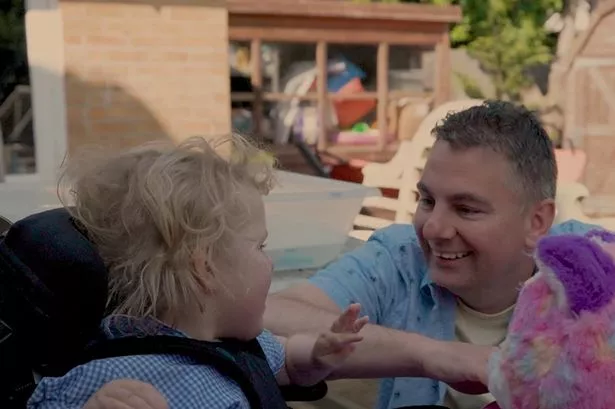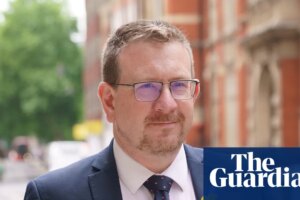
‘There are parts of the road that are completely impassable and we have to then travel on the road because the pavements are awful’
Bonnie was born with the most severe form of Spina Bifida (Image: stiltz.co.uk)
At just five-years-old Bonnie Barrow from Penarth has undergone seven operations, more than many people face in their entire lives. The “cheerful” little girl, loves her time at school and thrives with the brilliant modifications at home – including a special stairlift – but it’s when she and her family spend time outside that the difficulties start.
Bonnie’s dad Stuart spoke to WalesOnline about the issues she and her family face getting out and about around their home town, noting that the pavements can be “impassable.” And they’d love to take the water-lover to the local leisure centre, but there’s no suitable changing facilities on site for Bonnie.
When she was born Bonnie was transferred straight into neonatal intensive care at the Children’s Hospital for Wales. In those early months, Bonnie had no control of her head and an open wound on her back, which made it difficult for Stuart and his family to move her around their home.
Stuart has had to make many provisions in his home to ensure it is accessible for Bonnie and install equipment to help her including a stairlift from Stiltz, a sensory room with a ceiling track hoist, ramp access and a hydrotherapy pool in the garden.
After installing the Stiltz lift, Stuart said: “Bonnie loves it. She wheels herself in, presses the buttons and decides where she wants to be.
“That small level of independence has made a huge difference. She feels more connected to her home and has more control over her day. There are practical benefits, of course, but the emotional impact is harder to describe. We feel more connected as a family and can enjoy everyday moments again without stress or fear.”
Bonnie is a “cheerful little girl” and enjoys her time in mainstream school, however she has had to take time away due to her health issues.
Stuart has had to make alterations to his home to make it more accessible for Bonnie, including a stair lift (Image: stiltz.co.uk)
Stuart says that Bonnie’s school in Penarth have been “absolutely fantastic” in making the building accessible for Bonnie.
However, not everywhere is as accommodating as Stuart says he has had serious issues with the pavements around Penarth being “impassable” for Bonnie in her wheelchair.
Stuart said: “I think in general Penarth’s pavements are quite bad. There are parts of the road that are completely impassable and we have to then travel on the road because the pavements are awful.
“We actually have a lot of trouble getting her to school in her wheelchair and she can’t even self propel herself because the pavements are so bad, so we have to always push her in a wheelchair.”
Not only have Bonnie’s family found the streets inaccessible for Bonnie, they have struggled with extra-curricular activities too.
Bonnie is in mainstream school but has had to have time out due to her health (Image: stiltz.co.uk)
Bonnie enjoys her hydrotherapy pool at home and loves the lights and to splash in the water. But Stuart and Emma have yet to find a swimming pool in the area where Bonnie can get one-to-one classes.
Stuart has also found difficulty with facilities that do not have the changing facilities Bonnie requires. When a place does not have a Changing Places toilet it means that Bonnie’s visits are often cut short.
A Changing Places toilets are larger accessible toilets for severely disabled people, with equipment such as hoists, curtains, adult-sized changing benches and space for carers.
Stuart says: “If we want to be there for, say, half a day for something, it’s impossible because there’s no way of changing Bonnie. We have to take her home. Whereas if it had a Changing Place where we could change her, we could spend the day there.”
There are many people in Bonnie’s life and in the community that have been “brilliant” with Bonnie and accommodating which helps her live with minimal support and more independently.
Stuart said: “With some small modifications to your house or the community environment children can live quite independently or with some minimal support.
“And I think from Bonnie’s perspective, having a school that’s really accessible and friendly and the teachers and the environment wanting to be supportive and be trained is brilliant, it makes life easier.”
Cllr Gwyn John, cabinet member for leisure, sport and well-being, said: “Although we are not aware of any pavement issues in the area, we’re happy to pass along any concerns raised to the Highways team to investigate further, and we would also be pleased to invite Stuart and his daughter to meet with the team, review the facilities, and discuss how we can best support their needs, including through our one-to-one swimming lessons at Penarth Leisure Centre.”
Bonnie was born with an open spine and was diagnosed with the most severe form of Spina Bifida, Myelomeningocele, starting her operations when she was just four days old.
She underwent a major back closure operation, followed by a second procedure to fit a shunt after developing hydrocephalus, a build up of fluid on the brain. Bonnie’s Spina Bifida means that she is paralysed from the waist down and is a wheelchair user, she also has just one kidney and experiences a range of visual and hearing impairments.
If Spina Bifida is diagnosed in a foetus, the family are given the option to terminate the pregnancy however Bonnies parents, Stuart and Emma Barrow want people to understand that it does not have to be that way for many people anymore. Stay informed on the latest health news by signing up to our newsletter here
Stuart said: “The default has always been termination, but that is no longer needing to be the case. It’s not right or wrong either way, it is very dependant.
“Spina Bifida looks different on everyone, I know someone in his 50s who has Spina Bifida who does the same job I do. Tanni Grey-Thompson, different again but she is an Olympian and then you have people like my daughter who is facing a lot of challenges.
“It’s about just letting people know that with a bit of help and support, you know, people can be integrated in society and contribute.”





